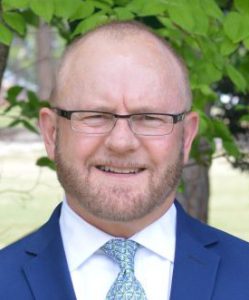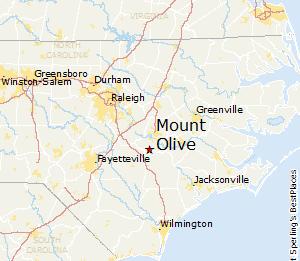Pastor Dennis Atwood concluded a sermon series focused on gratitude last fall by challenging his congregation at First Baptist Church of Mount Olive to seek systemic solutions to systemic poverty and food insecurity in their rural corner of eastern North Carolina.
What they came up with is the “Gratitude Project,” an ongoing, $100,000 community development grant initiative for local individuals, nonprofits and ministries attempting to address the deep-seated causes of hunger and poverty in Wayne County.

Dennis Atwood
“We’re trying to do some intentional things to target that part of the community because it is undeserved in many ways. It’s a systemic problem, but the solution has to start somewhere,” Atwood said.
The effort caught the attention of Jason Coker, a Baptist minister and president of Together for Hope, a national community development coalition that addresses poverty and hunger mostly in rural areas.
In an email extolling the undertaking, Coker said he hopes other congregations will follow the example of Atwood and his church, which is affiliated with the Cooperative Baptist Fellowship.
“This is a huge investment in their local community, and I think it’s a great model for other CBF congregations,” Coker said. “It’s a truly good way for a church to make an impact on their town.”
 While being home to Mount Olive Pickle Co. and the University of Mount Olive, the town has a 26% poverty rate, mainly concentrated in neighborhoods near First Baptist Church that include substantial Haitian and Hispanic communities.
While being home to Mount Olive Pickle Co. and the University of Mount Olive, the town has a 26% poverty rate, mainly concentrated in neighborhoods near First Baptist Church that include substantial Haitian and Hispanic communities.
“Our part of Wayne County does not have overwhelming homeless that you can see visibly,” Atwood explained. “It’s more along the lines of dilapidated housing. You have many people and families in one house who can’t afford to live in their own dwellings. You also see a lot of vacant, overgrown lots. Like many other places, it’s a tale of two towns where you have a very obvious poverty pocket, and you have everything else on other side of the tracks looking fairly well kept. Our church is on right on the line of that part of our community that transitions into the poverty pocket.”
The community development effort is not the congregation’s first foray into helping the poor in its midst, he said. “We have been very involved in the community for years through coat giveaways in the winter, giveaways for local schools and for teachers and staff, and tutoring local school children. We have had a lot of different tentacles in the community, but that has been more with one-time giveaways and special events.”
First Baptist also has welcomed immigrant churches into its spaces for years at a time.
“We had a partnership with a Haitian congregation in our town, but they have moved on from our building to be autonomous,” the pastor said. “They have a growing and active ministry. But we continue to support each other. The Hispanic church we hosted also has moved into their own facility. We came to be sort of a waystation for them and a birthing place to launch them into a self-sustained congregation.”
But the goal behind the new ministry is to expand into long-term, community development ministry, he said. “We are really more interested in sustainable, ongoing projects that can take root and change the direction of people’s lives.”
“We knew we had these funds in reserve for years doing nothing, and the church voted unanimously to take this on.”
Atwood noted the congregation shared his enthusiasm for the idea right away. “We knew we had these funds in reserve for years doing nothing, and the church voted unanimously to take this on. The committees and councils of the church were supportive and excited about an opportunity to give back to the community out of gratitude for what God had done for us.”
Grant applications, which have come in at a “slow trickle” since the effort went public in April, so far include one to provide piano lessons and pianos to “economically challenged kids,” two after-school tutoring enterprises and a youth football program for impoverished children in the first through sixth grades.
There also are a couple of proposals brewing that revolve around home renovations and home improvement for homeowners who can’t afford to improve their homes.
The church requires reports on progress at the six-month and one-year mark, Atwood said. “This is not about coming in for a one-time grant. And we are hoping other churches and organizations may see what we are doing and spin off their own ministries like this.”
Atwood said the initiative has helped him and his congregation as they seek a new rhythm after COVID-19.
“It’s very a very rewarding experience to me to be engaged in hands-on ministry where can we put this money where it will do the most good for the most people. It’s supposed to be who we are — the presence of Christ in the community and the world.”
Related articles:
How churches can help encourage financial capital in nonmetro areas | Analysis by Brian Foreman and Justin Nelson
Innovation can convert ‘sacred spaces’ to congregational revenue, church leaders testify

